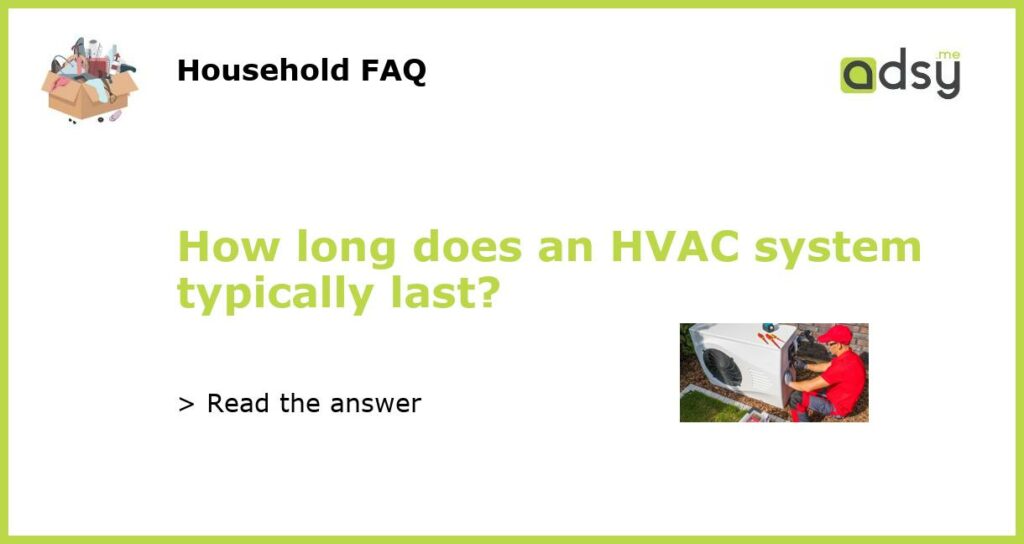Introduction
An HVAC system, which stands for heating, ventilation, and air conditioning, is an important component in any residential or commercial building. It is responsible for keeping the indoor environment comfortable by regulating temperature, humidity, and air quality. As with any mechanical system, an HVAC system has a limited lifespan and will eventually need to be replaced. In this article, we will explore how long an HVAC system typically lasts and factors that can affect its lifespan.
Average Lifespan of an HVAC System
The average lifespan of an HVAC system can vary depending on several factors, such as the type of system, maintenance, and usage. Generally, a well-maintained HVAC system can last between 15 to 25 years. This lifespan applies to both residential and commercial systems, although commercial systems tend to have a shorter lifespan due to their larger size and higher usage.
It’s important to note that the lifespan mentioned here is a general estimate and individual systems may deviate from this range. Factors such as brand quality, installation quality, and geographical location can influence the longevity of an HVAC system.
Factors Affecting HVAC System Lifespan
There are several factors that can affect the lifespan of an HVAC system:
a) Maintenance: Regular maintenance is crucial for the longevity of an HVAC system. Neglecting maintenance can lead to performance issues, increased energy consumption, and premature failure. It is recommended to have your HVAC system inspected and serviced by a professional technician at least once a year.
b) Usage: The more an HVAC system is used, the more wear and tear it will experience. Commercial systems, which often run continuously, tend to have a shorter lifespan compared to residential systems that are used for fewer hours per day.
c) Installation Quality: Proper installation is vital for the optimal performance and lifespan of an HVAC system. Poor installation can result in inefficient operation, premature breakdowns, and overall reduced lifespan. It is essential to hire a certified HVAC contractor for the installation process.
d) Geographical Location: Extreme weather conditions can impact the lifespan of an HVAC system. For example, systems in areas with hot and humid climates often work harder and may wear out more quickly. Additionally, systems in regions with harsh winter weather may experience strain from excessive heating demand.
Signs of an Aging HVAC System
As an HVAC system approaches the end of its lifespan, it may start exhibiting certain signs of aging. Recognizing these signs can help homeowners and building managers plan for the replacement of the system. Common signs of an aging HVAC system include:
a) Increased Energy Bills: One of the first signs that an HVAC system is nearing the end of its lifespan is a sudden increase in energy bills. As the system ages, it becomes less efficient and requires more energy to operate.
b) Frequent Repairs: If you find yourself constantly needing to call for HVAC repairs, it may be a sign that your system is approaching the end of its lifespan. The cost of repairs can quickly add up, making it more cost-effective to invest in a new system.
c) Uneven Temperatures: An aging HVAC system may struggle to maintain consistent temperatures throughout the building. Certain areas might be excessively hot or cold, indicating that the system is no longer able to distribute air properly.
d) Noisy Operation: As components wear out, an HVAC system may start making unusual noises such as squealing, banging, or rattling. These noises can indicate that parts are loose or failing.
Planning for HVAC System Replacement
When an HVAC system nears the end of its lifespan or starts exhibiting signs of aging, it is wise to start planning for its replacement. Planning ahead allows time to research different options, obtain multiple quotes from HVAC contractors, and secure financing if necessary. Additionally, replacing an HVAC system before it completely fails can help prevent discomfort and costly emergency repairs.
When considering a new HVAC system, it is important to choose one that is energy-efficient and properly sized for the building. Energy-efficient systems not only save on utility bills but also have a longer lifespan. Consulting with an expert HVAC contractor can help determine the best system for your specific needs.
In conclusion, an HVAC system typically lasts between 15 to 25 years with proper maintenance and usage. Factors such as maintenance, usage, installation quality, and geographical location can affect the lifespan of the system. Recognizing signs of an aging HVAC system and planning for its replacement in advance can help avoid discomfort and unexpected expenses.

